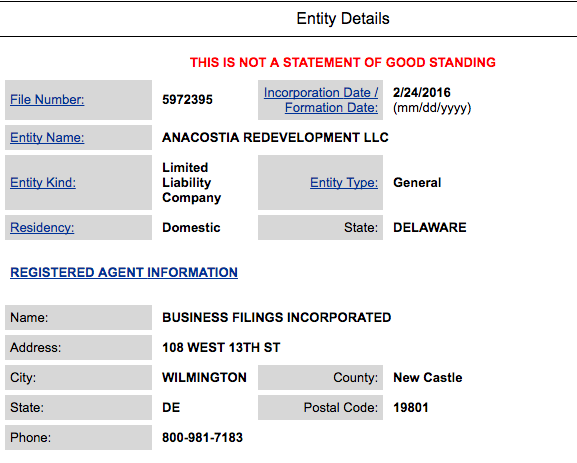An anonymous Delaware LLC is funding a push to legalize gambling in Washington DC
April 1st, 2016
April 1st, 2016
Late last year, we wrote about how an anonymous company incorporated in Delaware purchased Nevada’s largest newspaper, the Las Vegas Review-Journal. The move left the paper’s staff, its readers, and even presidential candidates, puzzled. We finally found out who was behind that takeover, but today we have yet another example of how corporations can be used to hide one’s identity. Instead of buying a newspaper, this time the company in question is helping to fund a ballot initiative to legalize gambling in Washington D.C.
As American University’s WAMU reported, the group pushing for gambling legalization has been funded by an anonymous company based in Delaware:
Initial funding to place the initiative on the ballot — which requires proponents to collect some 25,000 signatures from registered D.C. voters — has come from a $5,500 contribution from Anacostia Redevelopment, a limited-liability corporation registered in Delaware. Jerrels offered no specifics on who is behind the corporation, or who else will be financing the effort.
“There’s a consortium that’s ebbed and flowed,” says Jerrels.
A quick entity search on the State of Delaware website shows that the LLC, Anacostia Redevelopment, was incorporated in late February:

However, thanks to lax disclosure requirements, little else is readily known about the ownership structure, or who is really behind the funding. Delaware, where Anacostia Redevelopment is incorporated, was recently ranked as the second easiest place in the world to open an anonymous company, after Kenya.
As WAMU’s reporter, Martin Austermuhle, points out, the history of previous pushes to legalize gambling in the District offer some clues, but little by way of concrete evidence. And that’s because no state in the U.S requires an owner to disclose their identity, giving pretty much anyone the ability to open a company anonymously. This leaves the system extremely vulnerable to corruption and criminal abuse.
Global Witness, a London-based NGO and member of the FTC, documented how anonymous companies incorporated in the U.S. have been used by everyone from corporate tax evaders and fraudsters to drug cartels and arms dealers to carry out their crimes.
Fortunately, there’s a straightforward fix: registers of beneficial ownership.
If companies had to disclose their beneficial owner(s) when incorporated, it would help investigators, journalists, and civil society peel back the layers that anonymous companies create and stop crimes before they start. Some countries have already begun taking steps to implement registers. Ukraine launched its register last year, and the UK’s register will come online later this year. The EU passed a law requiring similar registers, though they won’t be completely public.
The U.S. should take steps to catch up to Europe, because then figuring out who’s behind political campaigns and ballot initiatives would be a little less like spinning the roulette wheel.